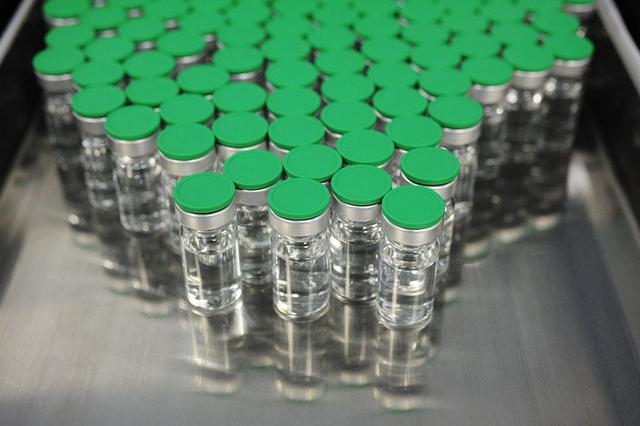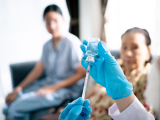The first batch of an adjuvanted H5N1 influenza vaccine intended for US pandemic preparedness won't arrive for another 2 years, officials revealed last week at a meeting of the Advisory Committee on Immunization Practices (ACIP).
The vaccine, called Q-Pan H5N1, is made by GlaxoSmithKline (GSK) at a Quebec facility and was licensed in 2013. GSK officials said this week that the vaccine is being delayed because of an upgrade of the company's North American manufacturing facilities.
ACIP recommendation on hold
The ACIP was scheduled to vote on a recommendation concerning use of the vaccine in workers who have a risk of occupational exposure to the highly pathogenic Eurasian H5N1 virus, which rarely infects humans but is often deadly when it does.
But the first post-licensure lot of the vaccine won't be available for 2 more years, because of a change in the manufacturing schedule, Sonja Olsen, PhD, of the Centers for Disease Control and Prevention told the ACIP.
As a result, an ACIP subcommittee decided to postpone its proposed recommendation on use of the vaccine in occupational risk groups, ACIP member Douglas Campos-Outcalt, MD, MPA, said at the meeting.
"We didn't want to make a recommendation and have no vaccine for that," ACIP chair Jonathan Temte, MD, PhD, told the group. The postponement prompted little discussion by the committee.
At the meeting, Olsen didn't describe the reason for the change in the manufacturing schedule. In response to questions, GSK officials issued a statement to CIDRAP News this week.
GSK statement
The company said the ACIP formed a work group in February 2014 to consider whether H5N1 vaccination should be recommended for those who have a risk of occupational exposure to the virus during "inter-pandemic periods." The number of workers in that category was estimated at less than 3,000.
A vote on the recommendation was scheduled for the ACIP's February 2015 meeting, but it was delayed until the June meeting because of a snowstorm in Atlanta, the GSK statement said.
"During the current inter-pandemic period—while GSK does not have an active task order to manufacture our H5N1 vaccine—we made the decision to upgrade our H5N1 vaccines manufacturing network in North America," the company said.
"GSK is a strong partner to public health authorities on pandemic preparedness," it added. "Reviewing and evolving our manufacturing network is an important part of planning our response to influenza-related health threats. We periodically perform upgrades and improvements to our global manufacturing network and that work is now underway."
The statement gave no details on the nature of the upgrade or which specific facilities are affected.
Approved in 2013
Q-Pan H5N1 was approved by the Food and Drug Administration (FDA) in November 2013. It contains GSK's adjuvant, AS03, combined with a smaller dose of antigen than in standard flu vaccines (3.75 micrograms instead of 15 mcg). The vaccine is based on a 2005 H5N1 strain from Indonesia.
"In clinical studies, the adjuvanted formulation stimulated the required immune response while using a smaller amount of antigen as compared to a formulation without adjuvant," GSK said when the vaccine was licensed. "This could translate to a greater number of doses available at the time of a pandemic."
A draft recommendation on use of Q-Pan H5N1 was included in slides presented at the ACIP's October 2014 meeting and now available on the ACIP Website. The recommendation said those who have possible occupational exposures to the H5N1 virus include lab workers who may handle the live virus in connection with human samples or animal experiments, and public health responders who investigate or manage suspected or confirmed H5N1 cases in humans or animals.
The recommendation was listed as a Category B one, meaning the decision to vaccinate would be up to doctors and their patients.
The federal government has a supply of an older H5N1 vaccine made by Sanofi Pasteur. The Biomedical Advanced Research and Development Authority (BARDA) "has stockpiled more than 200 million doses of pre-pandemic H5N1 bulk vaccine covering several virus variants, and over 40 million doses of H7N9 vaccine, all of which can be made available when combined with adjuvants," BARDA director Robin Robinson, PhD, told CIDRAP News in a statement. A BARDA official said the 200 million doses of H5N1 vaccine include some from manufacturers other than Sanofi.
BARDA, part of the Department of Health and Human Services, had contracted with GSK to develop an H5N1 vaccine with antigen-sparing potential.
See also:
Nov 25, 2013, GSK statement on FDA approval of Q-Pan H5N1
Related Nov 15, 2012, CIDRAP News story concerning FDA deliberations on Q-Pan H5N1
H5N1 vaccine slide presentation from October 2014 ACIP meeting




















